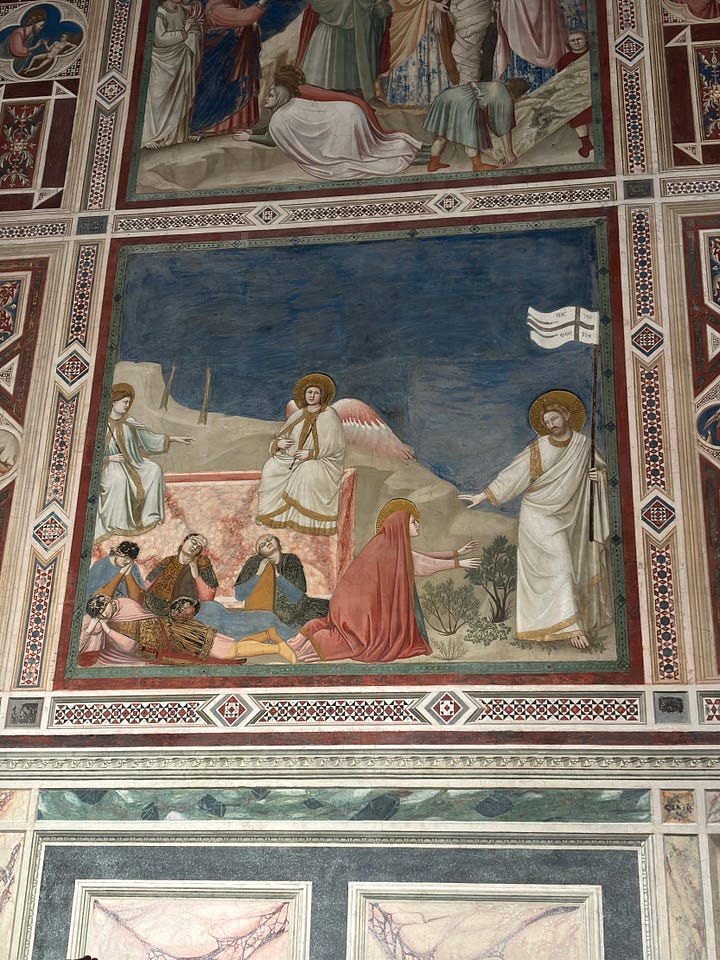Yesterday was one of those times when you read/hear a passage of Scripture that you have interacted with many times before, but suddenly, a new significance from the text jumps out at you. Scripture is a feast, and new delicacies are endless. The Gospel reading from the lectionary was from Luke 8:26-39. This is the account of Jesus traveling to the Gerasenes, a Gentile area. There, he encountered a demon-possessed man who fell before him as the demons shouted, and Jesus asked, “What is your name?”
“He said, ‘Legion’: for many demons had entered him.” (v.30)
Jesus sends the demons into a herd of pigs that drown themselves. (This was my favorite part as a kid.) Let’s fast-forward to the end of the passage that grabbed my attention.
“The man from whom the demons had gone begged that he might be with him; but Jesus sent him away, saying, ‘Return to your home, and declare how much God has done for you.’ So he went away, proclaiming throughout the city how much Jesus had done for him.” (v. 38-39)
This man’s entire life had been changed by Jesus. The text describes terrible details of his life before Jesus. His greatest desire after experiencing healing and freedom in Christ was to cling to Jesus, his savior. We read that the people of the town witnessed his remarkable transformation and were terrified, and begged Jesus to leave them! But this man desired to remain in the presence of the Lord. Jesus’ response, though, is to “send him away.” When we read those words, they may seem harsh to us. First, I would like to glance at the Greek text to see if “send away” is the best way to convey what Jesus did. The verb used in this verse has the connotation of “to release” more than to send away. Plus, Jesus does not just release him - Jesus commissions him! He dismisses him with a purpose, to go home and preach the Gospel. This will not be an easy task, as his townspeople just begged Jesus to leave out of fear. The easy path for this man would be to stay with Jesus, yet he is dispatched by Christ for the harder work of proclaiming Christ to a hard-hearted people.
My brain started making connections to the story of another person Jesus cast a legion of demons out of. This person also tried to cling to Jesus and was instead sent on a mission to preach. This person was Mary Magdalene. Mark 16:9 and Luke 8:2 refer to MM as a person Jesus cast out seven demons from. What is unfortunate is that some church traditions have decided that her demons pointed to her being sexually immoral. We have all heard this line of thinking - yet it has no scriptural support whatsoever. (Book recommendation: The Mary We Forgot by Jennifer Powell McNutt)
I wonder why no tradition remembers the Luke 8 man as sexually immoral? Hmmm…
There is another similarity between these two healed, demon-possessed people - they both desired to cling to Jesus and were both released to preach the Gospel. All four gospel accounts place Mary Magdalene at the empty tomb, but John 20 recounts the event we are considering. She recognizes the voice of her Rabbouni (teacher) and rejoices in his resurrection.
“Jesus says to her, ‘Do not hold on to me, because I have not yet ascended to the Father. But go to my brothers and say to them, ‘I am ascending to my Father and your Father, to my God and your God.’” (John 20:17)
Again, we find Jesus releasing someone from staying in the safe and comfortable place of his presence and being commissioned for the harder work of preaching. The Greek word is different in this passage from the one used in Luke 8, but it still does not carry with it any idea of Jesus being unkind to Mary with his words, as some have understood it.
This event has been famously represented in religious art throughout the centuries. In my work with the Visual Museum of Women in Christianity, I have written about many examples of art depicting this event. The Latin Vulgate text of John 20 is “noli me tangere,” which translates more to “do not touch me.” Unfortunately, that translation may have led to the negative interpretations of this event. Jesus was not refusing her touch and sending her away. He was commissioning her as the first apostle to share the news of the resurrection.


If you would like to read about these art pieces and view more, please visit the Mary Magdalene collection at The Visual Museum of Women in Christianity.
This morning I listened to the new episode from The Alabaster Jar podcast, and they discussed another Biblical account with some parallels. Dr. Lynn Cohick and co-host Dr. Kelly Dippolito talked with Dr. Nika Spaulding to talk about the new book And Upon this Rock, which she co-edited and contributed a chapter to. There is a chapter in the book that examines the Transfiguration through the lens of Peter. In Matthew 17, we read that Jesus took Peter, James, and John up a high mountain and was transfigured before their eyes. If that wasn’t overwhelming enough, Moses and Elijah showed up too!
“Peter said to Jesus, ‘Lord, it is good for us to be here; if you wish, I will make three dwellings here, one for you, one for Moses, and one for Elijah.” (Matt. 17:4) Peter wanted the same thing as the healed demon-possesed man from Luke 8 and Mary Magdalene in John 20. He wanted to remain in the presence of Jesus, Moses, and Elijah. Who wouldn’t? He asked to build tents/homes for the three revered prophets so they could stay and meet together indefinitely. This time, God interrupts Peter’s request (making me giggle) to redirect focus on Jesus and commands them to listen to him. Jesus tells them to “get up” in verse 7, and then commands them not to tell anyone about what they had seen until after he was raised from the dead. This is a different type of commissioning, but still the “harder” thing. Can you imagine seeing what they witnessed and not being able to tell anyone about it?
So what do these passages tell us about Jesus? I see a savior who knows us, heals us, and surprises us. He understands that we desire to remain in his presence, where we are safe and secure. I also discover a savior whose heart is always turned to the world and the salvation of all mankind. He always redirects us from turning inward and thinking only about how he has healed us, to facing outward and obeying how he desires us to respond. The result is always to bring about his larger purposes. The easy path would be ruminating on our healings and mountaintop experiences, but Jesus seems to call us to something deeper. Jesus calls us to partner with him in revealing the Kingdom of God.
You can listen to this episode of The Alabaster Jar here or wherever you listen to podcasts. The Alabaster Jar





Nice connections!